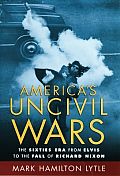Author2Author: Mark Lytle & Philip Jenkins
When I saw that Oxford University Press had published Mark Lytle’s America’s Uncivil Wars: The Sixties Era from Elvis to the Fall of Richard Nixon a few months ago, as well as Philip Jenkins’s just-released Decade of Nightmares: The End of the Sixties and the Making of Eighties America, I knew I’d found two men who would have something to say to each other. (Of course, I’ve been thinking about the era they write about a lot, considering that my own book overlaps them both…and as Jenkins notes on the OUP blog, that era is quite relevant to our contemporary situation.)
 Mark Lytle: You make a compelling case that by promoting issues such as drug abuse (especially crack), sexual predators, pornography, and family values, the conservatives addressed deeply felt fears among Americans, including once loyal New Deal Democrats. These attacks on crime and moral decay paid dividends at the polls as Reagan swept into the White House and Republicans made gains in Congress. So in that sense the moral crusade paid major political dividends—it was good politics. But was it not also in a sense tilting at windmills?
Mark Lytle: You make a compelling case that by promoting issues such as drug abuse (especially crack), sexual predators, pornography, and family values, the conservatives addressed deeply felt fears among Americans, including once loyal New Deal Democrats. These attacks on crime and moral decay paid dividends at the polls as Reagan swept into the White House and Republicans made gains in Congress. So in that sense the moral crusade paid major political dividends—it was good politics. But was it not also in a sense tilting at windmills?
We’ve turned prisons and incarceration into a major industry and a form of social welfare for rural communities. The DEA throws a paper curtain across our borders without any evident impact on drugs other than maintaining high levels of profitability for dealers. As you put it, “Tthrough the early 1980s, there was a staggering disconnect between the portrayal of menaces and what could plausibly be seen as their substances.” In that light, could we not argue that the major legacy of this era, while good politics, was bad public policy?
Philip Jenkins: Many of the worst and most troubling aspects of domestic policy today do indeed have their roots in what I’ve called the decade of nightmares between 1976 and 1986 —that is, in the Carter years as well as the Reagan era. You rightly cite the boom in prisons, the drug war, and the demonization of many types of offenders. And in tracing the history of these policy distortions, I would find it difficult to draw a line between Republicans and Democrats: the Clinton presidency yielded nothing to the Reagan times in its ultra-hard line on these issues. The only defense that one could make of these trends is that things probably had gone too far in the ultra-liberal direction in the mid-1970s, when people were naive about the harm that drugs could cause, and when attitudes towards child abuse had become scandalously negligent.
But there must be a happy medium between the two extremes. I would love to see a modern political leader stand up and challenge the orthodoxies of post-1980s criminal justice, reasserting for instance the value of non-custodial alternatives to prison, and making the significant reduction of the prison population a major policy goal. Someone should also be telling the drug enforcement authorities where to get off in terms of classifying chemicals, so that substances with real medical value could and should be used appropriately, whether that is for pain control or for psychiatric purposes. Someone needs to challenge absolute prohibitionism—and who knows, maybe such a campaign could bring libertarian Republicans together with liberal Democrats.
One of the great strengths of America’s Uncivil Wars is how you root the events and controversies of “the sixties” (that is, roughly, the tumultuous era from 1963-74) in the earlier decade, and you convincingly show the longer-term continuities. Looking at the broader span of American history, many would argue that periods of intense social/cultural/political/religious/sexual activism actually recur with some regularity, and the 1960s were only one recent manifestation. I think for instance of the 1840s, the years around 1915, and the late 1940s. (In fact, maybe historians shouldn’t be trying to explain the upheavals, but should rather be puzzling over what makes the intervening years so unnaturally tranquil!) But here’s a question: The more we look at the 1960s in historical context, should we be challenging the common impression that they were an era of unparalleled utopianism and creativity? Was the era really that different or novel?
Mark Lytle: I would say that the era was novel because of the scope of public unrest, but that its utopianism and creativity were certainly not unprecedented or unparalleled. Indeed, I would argue that in the arts the 1950s were a more fruitful era. In some ways the politicizing of the arts in the 1960s had the same inhibiting effect on creativity as was evident in the 1930s. As you suggest, the 1960s certainly manifested much of the revivalist and reformist spirit of the 1840s and even the Great Awakening in the 18th century. Sixties movements we think of as primarily secular—The New Left and Environmentalism come to mind—evidenced significant religiosity. Religious leaders drove the early phases of civil rights and their connection to the church gave the movement much of its legitimacy. And there can be no question that much of the counterculture reflected a rejection of American materialism and a quest for transcendent spiritual values.
So what was novel about the Sixties? I think the war in Vietnam gave activists a sense of moral imperative that added exceptional numbers and intensity to protest. The war factor was missing in the earlier reform eras. Media would add a second factor. Through television, events of the era had greater immediacy and protestors could send their message to a far wider public. The varieties and intensity of protest distinguish the 1960s, but the era certainly echoes earlier eras of protest and reform.
Philip Jenkins: You raise vital questions about the “conventional narrative” of the 1960s, about how, for instance, it understates the underlying conservatism of many Americans, the religious undercurrents, and so on. But might we not go further? Looking back at the 1960s, should we not give a lot more credit to those who loathed “60s-ism”, who thought that American society had taken a really bad turn? Even today, I think, many historians tend to dismiss 60s-era conservatives as motivated by the worst of impulses, by short-sighted economic selfishness, and especially a crude racism; images of Archie Bunker and George Wallace predominate. But in light of later second thoughts about drugs or street crime or sexual experimentation or youth rights, do you think that a “fair and balanced” history of the 1960s should pay more attention throughout to the conservative critique?
 Mark Lytle: Certainly, any historian who aspires to write a “fair and balanced” history of the 1960s must place the conservative movement at the center of the narrative. That movement was far more complex than the Bunker-Wallace stereotype suggests. If we add J. Edgar Hoover to that dynamic duo, we see the reactive side of conservatism defined largely by events and trends its advocates found threatening or offensive: sex and violence in the media, rights for African-Americans, women, and gays, or drugs, protest, and other signs of lawlessness.
Mark Lytle: Certainly, any historian who aspires to write a “fair and balanced” history of the 1960s must place the conservative movement at the center of the narrative. That movement was far more complex than the Bunker-Wallace stereotype suggests. If we add J. Edgar Hoover to that dynamic duo, we see the reactive side of conservatism defined largely by events and trends its advocates found threatening or offensive: sex and violence in the media, rights for African-Americans, women, and gays, or drugs, protest, and other signs of lawlessness.
I doubt that brand of conservatism could have ever captured the political power the movement holds today. However, Bill Buckley and his acolytes tied conservatism to a body of ideas and traditional values that led a young Pat Buchanan to distinguish it from stuffy orthodoxy, Republican stand-pat-ism, and economic self-interest and embrace it as the snapping pennant of a fighting faith. The combination of reaction and idealism gave conservatism the broad appeal that allowed it to capture the Republican Party and then the government in Washington.
You have struck an interesting balance in your evaluation of Ronald Reagan. On the one hand you dismiss the uncritical praise of early hagiographers. As you argue Reagan did not create a revolution; he presided over one he inherited from the Carter era. On the other, Reagan was far more complex and engaged than the simple-minded cardboard figure drawn by his liberal critics. What were the major features of his character and of his presidency that led you to form your view of him?
Philip Jenkins: A lot of my personal view of Reagan goes back to one particular incident, namely the Reykjavik summit of 1986. The summit admittedly collapsed without a formal agreement, but the meeting allowed Reagan to show the kind of nuclear-free world he really wanted, which was a far more radical vision than even most extreme liberals dared hope for. Looking at Reykjavik, it is impossible to hold on to the then-popular vision of Reagan as a bumbling idiot manipulated by cynical handlers. You have to appreciate his decency, and his real concern for humanity. Also, when you consider the fall of Soviet Communism and the subsequent autopsies on the Communist system by sober historians, surely Reagan was correct in his overall vision, however extreme or unrealistic this looked at the time. As I have written, only Reagan held such ridiculous views about the fragility of Communism in the early 1980s, while all sensible and informed experts disagreed totally; and Reagan was ridiculously right. Look at the career of any leading world statesman over a decade or so, and see how far they succeeded in seeing their most far-reaching goals realized in that relatively short time. There aren’t many to compare with Reagan in the degree of their success during the eighties. If he was the idiot of legend, then he was an almighty lucky idiot, to a degree that beggars belief.
Now, that certainly does not mean that we have to agree with everything he did or believed, and on some issues of domestic policy in particular, I think he did real harm; I would cite the drug war in that context. I would also stress the power of underlying social trends, which would have benefited any president in 1983-84. But having said all this, Reagan’s achievement seems beyond dispute.
17 February 2006 | author2author |

 Our Endless and Proper Work is my new book with Belt Publishing about starting (and sticking to) a productive writing practice.
Our Endless and Proper Work is my new book with Belt Publishing about starting (and sticking to) a productive writing practice. 
